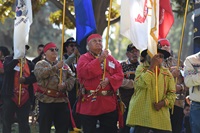California Native Americans, more than 750,000 strong, are represented in part by 109 California Tribes recognized by the Native American Heritage Commission. DWR is committed to open, inclusive, and regular communication with Tribal governments consistent with California Executive Orders B-10-11 and N-15-19, acknowledging California Tribes have the inherent right to exercise sovereignty over their members and territory. Tribes and Tribal communities have a unique relationship with water and the greater ecological landscape of their ancestral homelands including considerations for the environment, economy, and culture that supports the health and wellness of their members, residents and surrounding community. Tribes and Tribal communities reside throughout the state and exercise their deep connections to water and water-related resources.
DWR's Office of Tribal Affairs is the central point of government-to-government consultation and coordination with California Tribes to ensure proactive and meaningful engagement consistent with CEQA and DWR’s Tribal Engagement Policy. We strive to continue effective collaboration and informed decision-making where all parties share a goal of reaching a decision together with common values such as:
- Working to restore, protect, and manage the State’s natural resources for current and future generations.
- Using creative approaches and solutions based on best available science including Indigenous Knowledge.
- Developing strategies for preserving California Native American Tribes’ water rights and providing for the sustainable management of California’s sacred waters.
- Respecting Tribal sovereignty and maintaining an open and free exchange of information, resources, and interests.
Note: You may request documents listed below but not currently on this page by contacting us at tribalpolicyadvisor@water.ca.gov.
Contact Us:
Anecita Agustinez, Executive Manager, Office of Tribal Affairs
Mariko Falke, Executive Tribal Liaison, Office of Tribal Affairs



